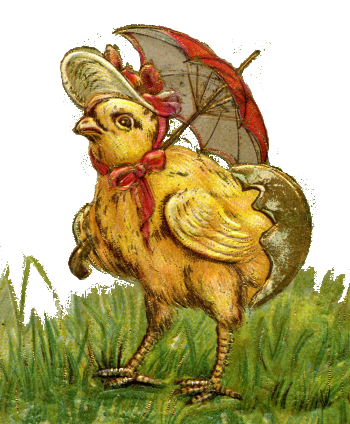
Easter, Chicks and Eggs
April 13, 2017 Tikalon is on a short Easter holiday. Our next article will be published Thursday, April 20, 2017. Fuzzy chicks and eggs are Easter traditions, and this break will allow your contemplation of the classic chicken or egg problem. | Image from a pre-1917 Russian Easter postcard. (Portion of a Wikimedia Commons image.) |
"if we suppose that small things must be the principles of greater, it is likely that the egg was before the bird; for an egg amongst sensible things is very simple, and the bird is more mixed, and contains a greater variety of parts."[4]In light of our mastery of genetics, scientists can assuredly answer that the egg came first. The domestic chicken, Gallus gallus domesticus is thought to have arisen from a union between the red junglefowl (Gallus gallus) and its grey junglefowl counterpart (Gallus sonneratii), both of these being wild birds. So this chicken egg, not made by a chicken, became a chicken.
References:
- Aristotle, "On the Generation of Animals," Arthur Platt, Trans., via Wikisource.
- Aristotle, "Generation of animals," Greek, with an English translation by Arthur Leslie Peck, Harvard University Press (Cambridge, 1943), 708 pp..
- Plutarch, "Symposiacs," from "The complete works of Plutarch: essays and miscellanies," Vol.III, Crowell (New York, 1909) via the University of Adelaide Library.
- Plutarch, "Moralia," Frank Cole Babbitt, Trans., Harvard University Press (Cambridge, 1957), 410 pp., via Archive.org.